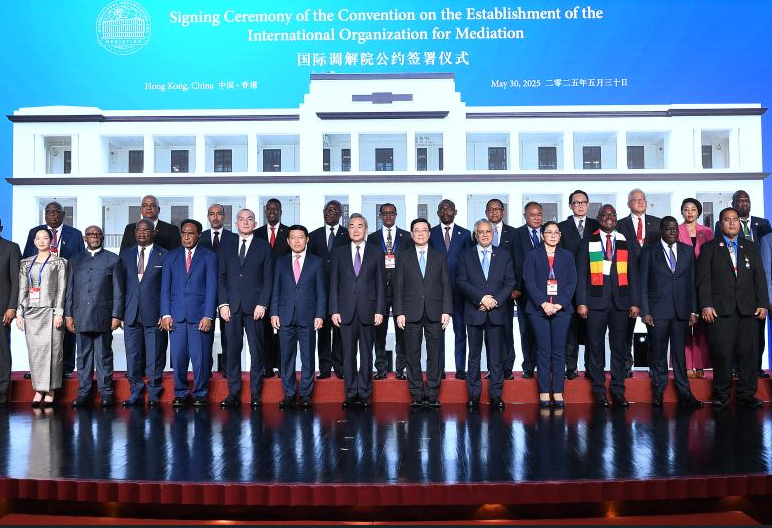Beijing inaugurates arbitration court in Hong Kong marking the start of Pax Sinica
About 30 countries have signed the convention establishing the IOMed, a new international organisation promoted by China for conflict mediation in a city on its way to be “normalised”. The new body reflects a version of multilateralism that is tailored-made for Beijing, which has ignored rulings by UN tribunals. This brings to mind the words of Chow Hang-tung, a lawyer jailed for her pro-democracy beliefs, on the effect of the emptying words like rights, democracy and peace of their meaning, in Hong Kong and beyond.
Hong Kong (AsiaNews/Agencies) – China has decided to set up a new international agency to settle international disputes headquartered in Hong Kong, a place whose courts have not exactly shone in the last five years in terms of international legal standards.
Wang Yi, the Foreign Minister of the People’s Republic of China inaugurated this morning the “Made-in-China” International Organisation for Mediation Convention (IOMed), which should be up and running in a few months.
The ceremony that gave birth to the new organisation saw some 30 countries sign its founding convention, which range from Serbia and Pakistan to Papua New Guinea and Venezuela.
“The birth of IOMed will help transcend the zero-sum mentality of ‘win or lose’, promote the amicable resolution of international disputes, and build more harmonious international relations,” said Foreign Minister Wang Yi, who presided over the signing in the former British colony.
The goal is for the body to act as a “neutral third party” in disputes, and help the parties work out a solution acceptable to both.
According to Hong Kong Chief Executive John Lee, the new body will mediate disputes between countries, between countries and individuals of another country, and between private international entities, “on a par” with the International Court of Justice of the United Nations and the Permanent Court of Arbitration in The Hague.
This is all wonderful, obviously, if it were not for two small details: it is promoted by the People’s Republic of China, and it is headquartered in Hong Kong.
Beijing has deliberately ignored court rulings in the past, as it did in the case of the Permanent Court of Arbitration in The Hague regarding the dispute with the Philippines over China’s territorial claims in the South China Sea.
With respect to Hong Kong, the fact that the city and its Chief Executive, John Lee, were chosen as the location and the poster boy for the new body for "conflict mediation" raises more than a few doubts about the type of "mediation" that can be expected outside the framework of the United Nations. After all local authorities have been cracking down on pro-democracy movement since 2019.
He choice is no accident. Hong Kong's Secretary for Justice Paul Lam wrote in an article today that the creation of IOMed comes just as “hostile external forces are attempting to de-internationalise and de-functionalise” Hong Kong.
This shows the real reason behind the initiative, namely revive Hong Kong’s fortunes as a "model" and a "crossroads" for “Pax Sinica” after it was forced into silence with the liquidation of the pro-democracy movement after its handover to the People's Republic in 1997.
To put the IOMed into perspective, it is worth rereading what Chow Hang-tung, a lawyer imprisoned in Hong Kong for membership in the pro-democracy movement, had to say. She is set to go to trial soon under Beijing’s national security draconian law and potentially faces life in prison in the headquarters of the new "conflict mediation" agency.
“The Party’s power to redefine words and subvert their meaning does not stop at the Chinese border,” she wrote from prison in December 2023. “And while during the Cold War, where one can identify and counter a distinct communist ideology and phraseology, today’s China is instead speaking the same liberal language of rights, democracy and peace. Crucial differences, of course, still exist, but are camouflaged under a raft of comforting phrases.
“For those of us who live under the Party’s rule, we know, of course, these familiar terms carry very different meanings in Party-speak. Rights are not about what individuals can assert against the state, but about empowering the state to safeguard the ‘rights’ of the people.
“Democracy is not about citizens holding leaders accountable through free association, expression and elections, but about leaders ‘graciously’ listening to the voice of the people through controlled channels. And peace is about ensuring submission to the Party’s order through whatever means, not the rejection of war nor hatred.”
Of course, “It is indisputable that the current international order is heavily dominated by the West, and thus still quite far from the ideal of law-as-values. But the way to improve it is not by giving more voice to the non-western dictators, which could only deepen the silence of the hitherto voiceless."
Instead, “ordinary people must be empowered to join in the conversation on values through the building of democracy everywhere. Again, a difficult and not uncontroversial task, often decried as “interference” when such efforts and solidarity are extended across borders. Yet if we are to abandon the quest for democracy, we shall have no hope of ever building a just international order based on values.”
12/12/2023 16:19
21/03/2024 19:32
19/04/2007







.png)










